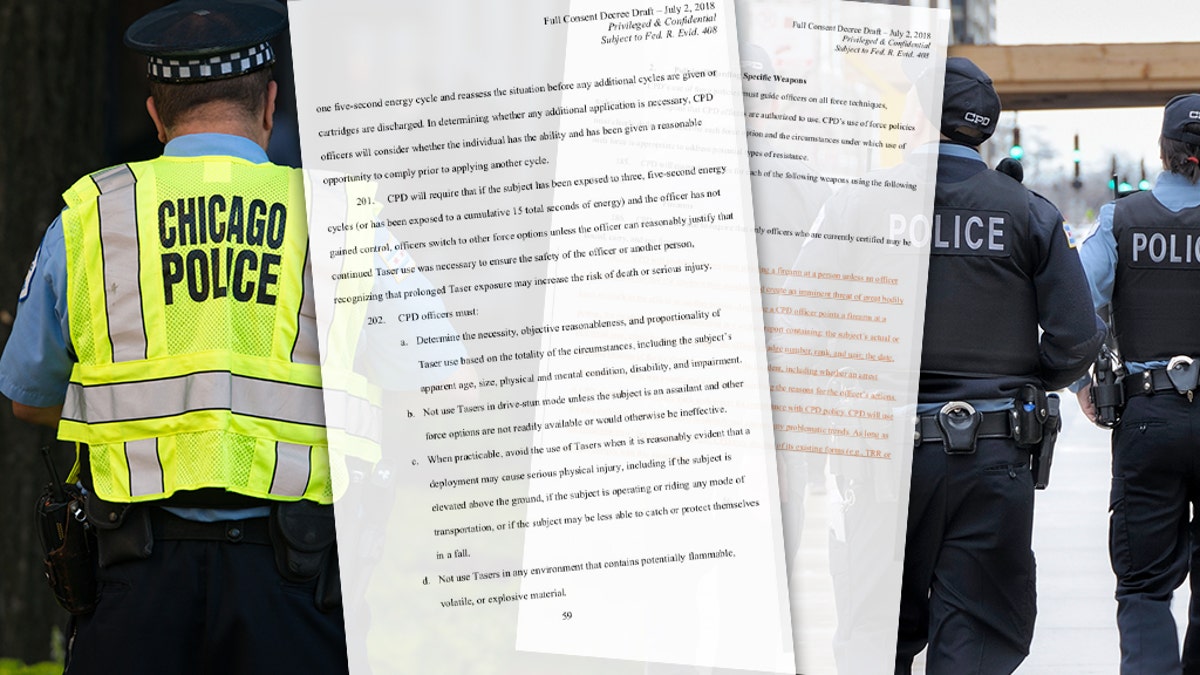
The Chicago Fraternal Order of Police is fighting a proposed consent decree it considers heavily anti-police. (iStock/Fox News, File)
CHICAGO – The Chicago Fraternal Order of Police is fighting to get a pending consent decree it considers heavily anti-police tossed out before the document is enacted and potentially brings a dramatic overhaul to the city’s police policy.
“The consent decree will make the simplest police duties and actions rife with ambiguity, and set up officers for discipline no matter how professional or appropriate their conduct,” Chicago FOP Vice President Martin Preib wrote in a statement to Fox News.
Fox News obtained what is believed to be a draft of the consent decree, which has been years in the making and is expected to be unveiled for the public in the near future.
The proposal stems from a lawsuit filed in 2017 by State Attorney General Lisa Madigan against the City of Chicago. Madigan filed the suit after a proposed federal consent decree under the Obama administration was not pursued by the Trump administration and Attorney General Jeff Sessions.
Police say one proposal they’re most concerned about would require officers to fill out a report every time they point their gun at a person.
A portion of a decree draft reads, “Any time a CPD officer points a firearm at a person, the incident should be documented in a written report containing: the subject’s actual or perceived race, ethnicity, age and gender; the officer’s badge number, rank, and unit; the date, time and location of the incident; the outcome of the incident, including whether an arrest or citation was issued; and a narrative describing the reasons for the officer’s actions.”
A police source tells Fox News some officers pull their guns out “every night” in some districts, and if the consent decree is passed, each time could become a “lawsuit.” The source said, “Imagine the headlines: This officer has 200 documented instances of pointing his gun. All the targets were minorities.”
The proposed decree also mandates a limited and specific use of stun guns, and would require officers to intensely consider the “totality of their circumstances” before applying force.
The FOP says the wording could make officers become more hesitant to engage in even basic policing on the streets.
“I think they’re putting our officers in a safety problem – immediately,” said Chicago FOP President Kevin Graham. “I think that you are going to see that officers may be hesitant, and we are not going to let our officers be injured or killed simply for a policy that makes other people feel good.”
In a statement to Fox News, a spokesperson for Madigan wrote: “Chicago has long faced serious problems that have endangered the lives of residents and police officers. A consent decree will require reform, transparency and accountability of the Chicago Police Department and require the training, resources and support police officers need to protect and serve the community.
"The only way to ensure those issues will be addressed on a sustained basis is through a consent decree overseen by a federal judge and an independent monitor.”
Preib wrote: “Chicago’s powerful anti-police movement, embedded in the city’s political institutions, remained undaunted. It compelled Lisa Madigan to break new legal ground to pursue a consent decree through a bizarre lawsuit that, if it succeeds, will effectively undermine policing in Chicago.”
In 2015, President Barack Obama’s attorney general, Loretta Lynch, launched a 15-month inquiry into the patterns and practices of the Chicago PD amid mounting allegations and complaints of police brutality and racism — and after the release of a controversial video in which Officer Jason Van Dyke shoots black teen Laquan McDonald 16 times, killing him.
Lynch’s investigation concluded that the Chicago PD “fails to properly collect and analyze data, including data on misconduct complaints and training deficiencies” and does “not give officers the training they need to do their jobs safely, effectively and lawfully.”
The DOJ investigation also “identified serious concerns about the prevalence of racially discriminatory conduct by some CPD officers.”
Research compiled by the ACLU a year prior to the launch of Lynch’s investigation seemed to support her conclusion. The ACLU study determined that in the summer of 2014, more than 250,000 people were stopped by police in Chicago, and that 70 percent of those “stop-and-frisks” were of African-Americans -- with some illegally harassed and publicly profiled.
"Most of us never saw this, never saw the experiences of the black Chicagoans around stop-and-frisks, but it was harmful to the community,” Karen Sheley, the director of police practices at ACLU Illinois, told Fox News in 2017.
Madigan’s lawsuit is both unique and controversial because it has allowed civilian groups to contribute toward the draft. These included University of Chicago law professors and the ACLU. Police have decried the giving of outsiders and people without law enforcement expertise a seat at the table in the formation of policing policies.
A spokesperson for the Illinois ACLU also said its office was unable to comment but said there would be more to discuss when a draft of the decree is released to the public.
City attorneys did not immediately respond to requests for comment.


